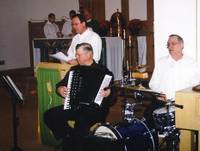On Polka and Catholicity
 Back in May we saw a flurry in the news about St. Stanislaus Kostka parish in St. Louis. The story, in sum, was that the parish somehow ended up under the governance of a civil corporation made up of laypersons. When Archbishop Burke pointed out that this situation contradicts canon law, which requires all parishes to be under the governance of the Church hierarchy, a revolt began. Even more disturbing - as our Polish resident of St. Blog's, the Polish Prince, pointed out to me at the time - this scenario echoes almost exactly the historical emergence of the schismatic 'Polish National Church' at the close of the nineteenth century. Back in May we saw a flurry in the news about St. Stanislaus Kostka parish in St. Louis. The story, in sum, was that the parish somehow ended up under the governance of a civil corporation made up of laypersons. When Archbishop Burke pointed out that this situation contradicts canon law, which requires all parishes to be under the governance of the Church hierarchy, a revolt began. Even more disturbing - as our Polish resident of St. Blog's, the Polish Prince, pointed out to me at the time - this scenario echoes almost exactly the historical emergence of the schismatic 'Polish National Church' at the close of the nineteenth century.
Well, the folks at St. Stanislaus popped up in the news again over the weekend. Still defiant, of course, but now the focus is on their liturgy. It turns out that St. Stanislaus is one of the many Polish parishes practicing the 'Polka National Rite,' which is a slight variation on the Novus Ordo, but with an accordion.
The affirmation of nationalistic/ethnic identity has always been characteristic of resistance movements to ecclesiastical authority, and can be seen in most of the schismatic movements in the Church's history -- cf., Gallicanism and Anglicanism (more overtly) and Lutheranism and Donatism (more subtly). Part of being a universal (read 'Catholic') Church means walking the balance between legitimate inculturation and a transcendence of all cultures, both required by the doctrine of universality. Unfortunately, an over-emphasis on either element leads to a distortion of Catholic teaching, which is all too evident in this case:
"They can take the priest," said parishioner Marek Parafiniuk, 27, of Brentwood. "We won't give up the parish. The people will still be here." Reminiscent here is a phrase from the first Christian to dub the Church 'Catholic' (at least, in the technical sense, as a title), St. Ignatius of Antioch, at a time when the Church was first beginning to deal seriously with its own increasingly-evident universality:
"Where the bishop is present, there is the Catholic Church" (To the Smyrnaeans 8:2)."
# posted by Jamie : 8:43 AM
|
|
